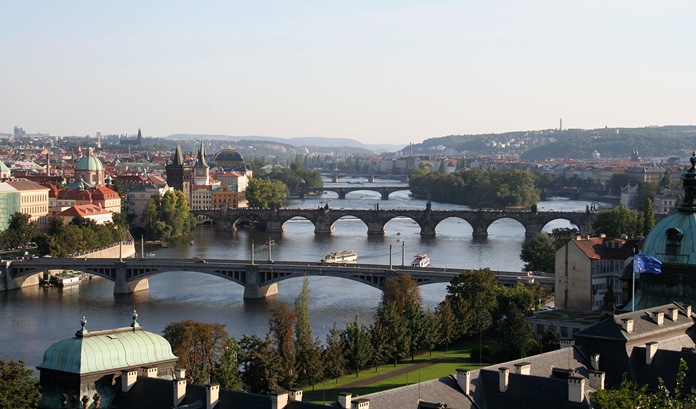When people think about Czech classical music, one composer tends to spring to mind. He’s the one who wrote the so-called New World Symphony. He was also famous for Songs my Mother Taught Me and a suite of seven piano pieces which he called Humoresques. Of course, you know who I’m talking about which is why I am not going to type his name. It simply takes too long. That’s because it contains three diacritical markings which are a real bother to find on the keyboard. Actually, they are not on the keyboard at all, unless you happened to have bought your computer in the Czech Republic. Adding these markings involves going to the “insert symbol” menu and searching among a dizzying collection of assorted hieroglyphics and squiggles.

There are of course, a great many other Czech composers but few pre-1900 composers seemed to have gained a foothold in Western Europe and America, let alone Asia. You may have heard the name Heinrich Ignaz Franz von Biber. At least, you should have heard it if (like the dogs and me) you’re a regular reader of this column. Then there was Jan Ladislav Dussek known to generations of student pianists for his relatively easy piano sonatas. Oh yes, and the composer-pianist Carl Czerny had Czech origins too. He studied with Beethoven no less, going on to be a brilliant teacher of piano techniques, so much so that his music is still used in piano teaching. There was Franz Benda and Franz Xavier Richter but you don’t hear much of their music these days.
As we plod through the annals of early Czech musical history the first “great” name is that of Bedøich Smetana, widely regarded in his homeland as the father of Czech music.
During the years 1874 and 1879 Smetana composed a set of six symphonic poems called Má Vlast which means “My Homeland”. They are sometimes presented as a single work with six movements, although Smetana had always intended them as stand-alone pieces. Technically they are symphonic poems, an orchestral form pioneered by Smetana’s Hungarian contemporary Franz Liszt. My Homeland is imbued with national idealism and each one of the works is intended to depict some aspect of Bohemian life and legend.
The symphonic poem Vltava is also known by its German name Die Moldau and dates from 1874. It’s a musical portrait of a river, not just any old river you understand, but the longest one in the Czech Republic. The River Vltava (vul-TAH-vah) is almost three hundred miles long, rising in southwestern Bohemia and journeying through the countryside until it reaches Prague, where the river is crossed by eighteen bridges.
Smetana helpfully provided the listener with a guide to the work writing that it “describes the course of the Vltava, starting from the two small springs… to the unification of both streams into a single current… its course through woods and meadows, through landscapes where a farmer’s wedding is celebrated, the round dance of the mermaids in the night’s moonshine: on the nearby rocks loom proud castles, palaces and ruins aloft. The Vltava swirls into the St John’s Rapids; then it widens and flows toward Prague… and then majestically vanishes into the distance.”
The main theme is remarkably like Hatikvah, the Israeli national anthem and evidently has its melodic roots in Romanian and Czech folk music. You’ll easily recognise the sequences representing the wedding, the moonlight scene and the thunderous rapids. This captivating work is given a wonderful performance by this young Slovenian orchestra with thoughtful conducting and effective tempo variations. There’s also excellent video and first-class sound.
You may not be familiar with Franz Krommer even though he was remarkably prolific, with at least three hundred published compositions including at least nine symphonies, seventy string quartets and many others for winds and strings. There are also about fifteen string quintets and dozens of concertos. Today he’s best known for his wind music and the concertos for two clarinets show him and his most entertaining.
Written around 1815, this is the second of the two concerti and was clearly intended as a crowd-pleaser with its catchy melodies and brilliant clarinet writing. It’s stereotypically classical and it’s also a technically challenging work cast in the usual three movements but you’ll have to search around on YouTube to find the second and third.
The video was recorded at the All Star Concert at the UCLA (University of California, Los Angeles) earlier this year, which accounts for the boisterous and enthusiastic behaviour of the student audience. But it’s a delightful performance and the two young soloists prove to be exceptional clarinet players.
 |
 |
 |





